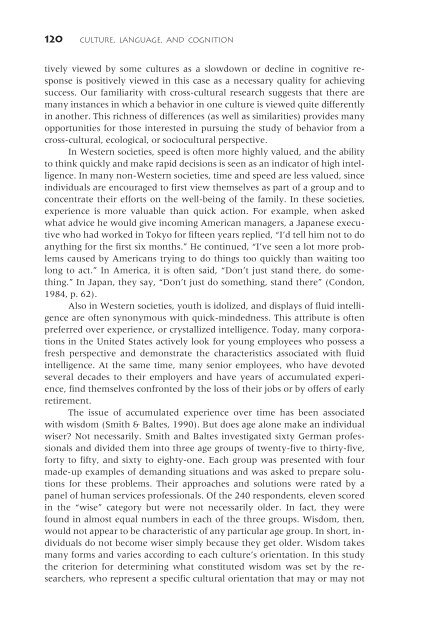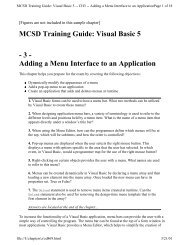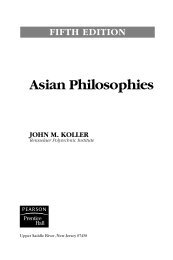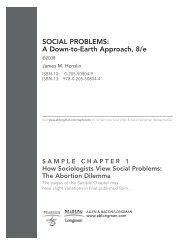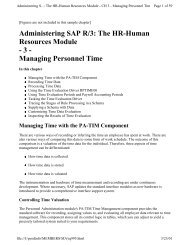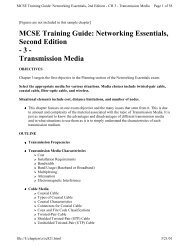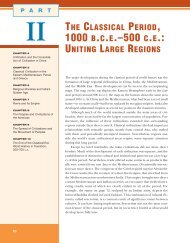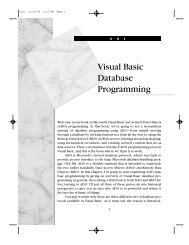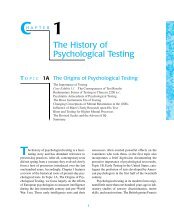CULTURE, language, AND COGNITION
CULTURE, language, AND COGNITION
CULTURE, language, AND COGNITION
You also want an ePaper? Increase the reach of your titles
YUMPU automatically turns print PDFs into web optimized ePapers that Google loves.
GA305c05.qxd 4/30/2004 11:26 AM Page 120<br />
120 culture, Language, and cognition<br />
tively viewed by some cultures as a slowdown or decline in cognitive response<br />
is positively viewed in this case as a necessary quality for achieving<br />
success. Our familiarity with cross-cultural research suggests that there are<br />
many instances in which a behavior in one culture is viewed quite differently<br />
in another. This richness of differences (as well as similarities) provides many<br />
opportunities for those interested in pursuing the study of behavior from a<br />
cross-cultural, ecological, or sociocultural perspective.<br />
In Western societies, speed is often more highly valued, and the ability<br />
to think quickly and make rapid decisions is seen as an indicator of high intelligence.<br />
In many non-Western societies, time and speed are less valued, since<br />
individuals are encouraged to first view themselves as part of a group and to<br />
concentrate their efforts on the well-being of the family. In these societies,<br />
experience is more valuable than quick action. For example, when asked<br />
what advice he would give incoming American managers, a Japanese executive<br />
who had worked in Tokyo for fifteen years replied, “I’d tell him not to do<br />
anything for the first six months.” He continued, “I’ve seen a lot more problems<br />
caused by Americans trying to do things too quickly than waiting too<br />
long to act.” In America, it is often said, “Don’t just stand there, do something.”<br />
In Japan, they say, “Don’t just do something, stand there” (Condon,<br />
1984, p. 62).<br />
Also in Western societies, youth is idolized, and displays of fluid intelligence<br />
are often synonymous with quick-mindedness. This attribute is often<br />
preferred over experience, or crystallized intelligence. Today, many corporations<br />
in the United States actively look for young employees who possess a<br />
fresh perspective and demonstrate the characteristics associated with fluid<br />
intelligence. At the same time, many senior employees, who have devoted<br />
several decades to their employers and have years of accumulated experience,<br />
find themselves confronted by the loss of their jobs or by offers of early<br />
retirement.<br />
The issue of accumulated experience over time has been associated<br />
with wisdom (Smith & Baltes, 1990). But does age alone make an individual<br />
wiser? Not necessarily. Smith and Baltes investigated sixty German professionals<br />
and divided them into three age groups of twenty-five to thirty-five,<br />
forty to fifty, and sixty to eighty-one. Each group was presented with four<br />
made-up examples of demanding situations and was asked to prepare solutions<br />
for these problems. Their approaches and solutions were rated by a<br />
panel of human services professionals. Of the 240 respondents, eleven scored<br />
in the “wise” category but were not necessarily older. In fact, they were<br />
found in almost equal numbers in each of the three groups. Wisdom, then,<br />
would not appear to be characteristic of any particular age group. In short, individuals<br />
do not become wiser simply because they get older. Wisdom takes<br />
many forms and varies according to each culture’s orientation. In this study<br />
the criterion for determining what constituted wisdom was set by the researchers,<br />
who represent a specific cultural orientation that may or may not


